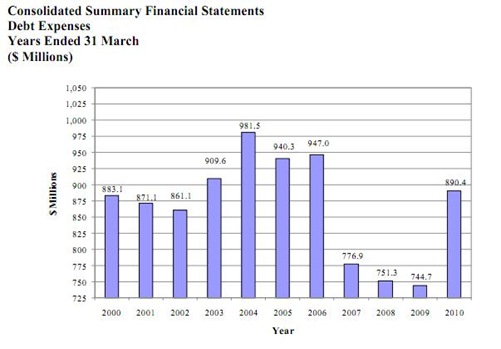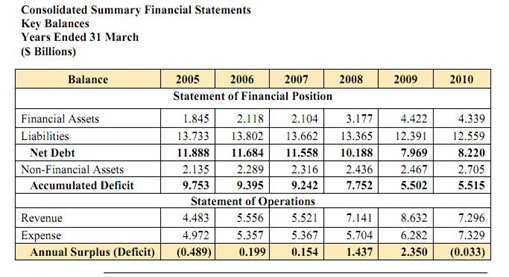A modest change in circumstances has made a dramatic change in the provincial government’s 2011 budget and a bigger change for 2012.
A decision by Terra Nova oil field owners to defer major renovations on the floating production platform means that the provincial government is now forecasting a surplus almost four times what they had before.
That’s right.
The extra production will boost the anticipated forecast surplus from about $59 million to $250 million.
Finance minister Tom Marshall dropped that little gem on a board of trade audience a couple of weeks ago.
But wait; there’s more.
Next year, Marshall expects a deficit of almost double the one previously forecast.
Surplus of $200 million will become a deficit of almost $500 million.
And Marshall says that will be applied to the net debt.
First of all let’s dispose of the completely slimy, disingenuous claim about applying any surplus to the net debt.
Net debt is not real debt. It is merely a paper transaction that represents total liabilities less any assets. A cash surplus gets counted as an asset, but as Marshall well knows it does absolutely nothing to reduce what the people of the provincial actually owe.
You bet that if Tom really posts a small surplus, he’ll be setting that money aside either to help keep the deficit in 2012 from ballooning or to fund cost over-runs on any of the mega-projects he and his mates have locked taxpayers onto.
So when the finance minister has to rely on deception you know the rest of it is bad as well.
What you have here is basically further evidence that the provincial government has put the public treasury in a dangerous state.
Take that forecast deficit for 2012 that is now set for $500 million.
That’s based on a rather optimistic forecast for oil prices.
Drop the price of oil and you can make it a much bigger number.
And we are not talking dropping oil by half its current price. We are talking dropping it by 20%.
or even 10%.
That half a billion will quickly become $750 million or a billion.
At least.
And if the price of oil drops in 2011, there won’t be an extra $200 million to help pay for it.
As easily as the surplus grew this year, the deficit could grow next year. Tiny changes in the local economy produce wildly different outcomes. This is not something a finance minister – as responsible finance minister – would brush off as cavalierly as Tom Marshall does.
A responsible finance minister would adjust spending to take account of these changes in revenues.
He or she would have a policy that said he will spend such and such a percentage of non-renewable revenues on this, another amount on the other other. So much would go into the bank and so much would pay down debt. Annual spending would rise by a predictable rate that was something around the rate of inflation.
As a result, people could know within reason what the world would look like five years out, regardless of whether oil prices went up or down. In the times of phenomenal prices, they would sit comfortably knowing that the public debt was vanishing – for real - or that they had a nest egg of public spending for roads and schools guaranteed to happen regardless of anything.
That sort of predictability is the kind of environment that promotes prosperity.
That sort of sound fiscal management attracts private investment from all over the world.
That sort of behaviour – safeguarding the public trust – helps build a sound economy.
How far is Newfoundland and Labrador away from that after a decade of Marshallism?
The big story in Newfoundland and Labrador on the last weekend in May is a racket between Marshall’s old boss and his new boss over whether the new boss should give the old boss’ latest hockey venture a half million tax dollars.
They are fighting over whether a bunch of sweaty jock-straps are worth a permanent subsidy of a half million because it is an economic investment.
And to make it worse, we are not talking about a full-on professional franchise mind you, like they are in Winnipeg.
We are talking about the farm team.
Face it.
The big news story in this province six months before the next election is a demand from a multi-millionaire to hand over a half million bucks so he can play at being a hockey mogul.
Doesn’t seem quite so impressive when you put it that way.
Does it?
But that’s a more honest and accurate version than talking about applying a surplus to the net debt.
Think about it.
- srbp -

